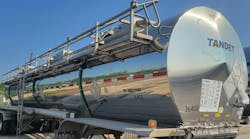View Reynolds Nationwide Photo Gallery
After passing across a pasture with large hay bales, an irrigation system, and stock tanks, the driveway leading to Reynolds Nationwide ends at the company headquarters in San Antonio, Texas.
The 120-acre scene is more reminiscent of a South Texas ranch than a foodgrade carrier's terminal.
And one suspects after meeting the owner, Dennis Reynolds, that farming holds a strong attraction second only to hauling milk, chocolate, tequila, and a variety of other liquid foodgrade products.
“I grew up on a farm,” Reynolds says. “Our family also hauled hay and grain.”
Although Reynolds was a farm boy, it wasn't too long after graduating from high school that he decided to head for the city. By 1970, Reynolds and his wife, Donna, had started their trucking company in San Antonio with one used International tractor.
“We purchased this property soon after we moved to San Antonio,” he says. “For many years our office was in our home.”
After establishing the trucking company, the couple almost immediately found themselves with a tank trailer fleet acquired from a Mexican company used to haul tequila. About the same time, Reynolds' accountant heard about a fleet of milk trailers for sale. Not one to wait until the cows come home, Reynolds bought the vehicles and added the dairy business to his lineup.
“I didn't really know anything about hauling milk,” Reynolds recalls. “In the beginning it was a lot like trial by fire.”
New customer
As the 1970s blended into the 1980s, Reynolds answered the phone one day to hear a New Jersey pet food processor on the other end of the line searching for a carrier to haul pet food ingredients.
“I don't know how he found us,” Reynolds recalls. Nevertheless, the phone call eventually led to even more business. Later, Reynolds formed a foodgrade division to service confectionary ingredients and soon was hauling ingredients for chocolate.
“This account was looking for a carrier that they could form a relationship with,” Reynolds says. “We had to learn the confectionary business, and to know what each plant needed as we became more specialized.”
As the transportation services were growing, Reynolds added a two-bay shop on the property that would eventually be expanded to four bays. In 2003, he built an extensive office complex for dispatching and administration.
Steady growth
Reynolds says he believes in slow, but steady growth as the best way to optimize his operation. The fleet has grown in response to customer needs and currently consists of more than 600 trailers and 260 Peterbilt tractors. Within that tank trailer number are 260 for milk service, 65 dedicated to kosher foodgrade, 32 for kosher chocolate, and 116 for non-foodgrade products. The carrier has a small number of dry vans, refrigerated trailers, and pneumatic bulkers. Tank trailers also are leased as needed to supplement the fleet.
Reynolds admits that today's trucking industry challenges are foreboding, particularly with the rising cost of fuel and the 38,000-40,000 gallons of diesel the company requires each day.
In addition to operating costs, the carrier must meet sanitary and security requirements. “Foodgrade transportation has always required specialized service with those regulations,” Reynolds says. “After the terrorists attacks in 2001, we faced even more security requirements.”
Another challenge is coordinating the varied products and services. “We couldn't have done it without constantly upgrading our computer systems,” he says. “As far as the fuel costs are concerned, our customers always have been sympathetic to our surcharges.”
More recently, he has made efforts to coordinate driver schedules more efficiently so they can reduce the number of times they drive their personal cars from homes to terminals. “Everyone is facing this fuel crisis,” Reynolds notes. “We are trying to help our employees as much as possible.”
Company management
In addition to Reynolds, company management includes Jim Lincoln, general manager; Ginger Reynolds, Reynolds' sister and milk division general manager; and Thom Reynolds, his brother and operations manager.
Together, they see that the complicated logistics required to serve a variety of customers runs smoothly. Two terminals in Houston, Texas, serve a brewery and milk processing plants. A terminal in London, Ohio, is near Columbus, and another is in Reno, Nevada. The operation in the Midwest transports product to pet food and candy processors.
“Both pet food and candy processors require strict product handling,” says Lincoln. “Tank trailers are dedicated to individual products and require strict foodgrade cleaning processes.”
In addition to the Midwest terminals, six drivers each are located in Mount Joy, Pennsylvania (dispatched from London for chocolate), and Fresno, California (dispatched from Reno for pet food products).
In the Southwest, terminals for milk transport are in Stephenville and Hereford, Texas. Trucks also are parked at facilities in Waco, Texas, for chocolate service and in Clovis, New Mexico, for milk transport. The Southwest operation is coordinated from the San Antonio headquarters.
Also receiving direction from San Antonio dispatchers is the tequila operation. Mexican carriers transport the 160-proof Mexican product to the United States border where Reynolds drivers take over to haul it to US and Canadian bottlers. The loads are destination specific to cities such as St Louis, Missouri; Lewiston, Maine; Montreal, Quebec, Canada; and Lethbridge, Alberta, Canada. Tequila is an extremely valuable product at about $160,000 per load, which means security is essential.
While the milk product values are not as high as tequila, there may be as many as 80 loads per day making their way throughout the service area, including backhauls. Typical service involves hauling milk from the farm to processors in the Texas Panhandle and from eastern New Mexico to San Antonio, Fort Worth, and Houston. Average distance for one trip is about 500 miles, Ginger says.
Although coordination required for the many products and extensive service area could make any head spin, the Reynolds Nationwide management team has it down to a fine art supervised by Lincoln, Ginger, and Thom.
Ginger and Thom manage separate operations, yet work together when the situation is called for. Their offices are adjacent to one another, so it's convenient for them to put their heads together for a conference.
“So much of our service is just-in-time,” says Dennis. “We have to really work hard to provide the dedicated service.”
Thom says coordinating the tequila and chocolate operations works even more smoothly with the addition of the SkyBitz system on tank trailers. “It's just incredible,” he adds. “We've had it about a year, and it provides vehicle location, equipment history, and mileage.”
All tractors are equipped with the Qualcomm QTracs fleet and management program that is used to link management to the company's 300 drivers.
Driver pool
“Our drivers are pretty much dedicated to individual tractors and tank trailers,” says Lincoln.
Lincoln points out that the slump in the trucking industry in general has resulted in an abundance of driver applicants. Some of the applicants are former owner-operators who have not been able to continue operating their own tractors because of the high cost of diesel.
The company requires driver applicants to be at least 24 years old and have tanker experience. Applications are reviewed by corporate administrators, but terminal managers handle training and make the final hiring decisions. Training covers company policies, Department of Transportation regulations, defensive driving, and hazardous materials handling for drivers who will be dedicated to the tequila operation.
Another essential element in the operation is the carrier's fleet. Newest tank trailers are supplied by Polar Tank Trailer LLC. The tanks used to haul products such as chocolate and milk are non-code while those in the tequila operation meet DOT407 code.
Tank trailers for chocolate are stainless steel, have 6,500-gallon capacity, and are equipped with Fort Vale outlet valves and Olsen vents. Stainless steel tank trailers for transporting milk have 6,700-gallon capacity and are equipped with a Texas-style clean-in-place system, L C Thomsen foodgrade valves, and Olsen vents.
The 6,500-gallon stainless steel tank trailers used to haul tequila have Betts valves and Girard pressure-relief vents.
Trailer running gear include Hendrickson Intraax air suspensions and MeritorWabco antilock brake systems. The trailers also have Truck-Lite lighting and wiring.
The carrier typically specifies Peterbilt tractors with Cummins or Caterpillar engines, Eaton Fuller AutoShift transmissions, Peterbilt suspensions, and MeritorWabco antilock brake systems. Roper pumps are mounted on some of the tractors, depending on product requirements.
Keeping the vehicles on the road falls to Ronnie Humphreys, maintenance manager in San Antonio. The four-bay shop provides routine maintenance and repairs for tractors and tank trailers. Mechanics continually check vehicles parked on the yard, looking for problems. In keeping with the pristine appearance required for foodgrade service, vehicles typically are washed after maintenance or repairs are completed.
The company also has begun plans for three new foodgrade tank cleaning facilities that will be designed with a water regeneration system, Dennis says.
As for future projections, Reynolds says he sees continuing growth in the Texas and New Mexico milk markets that will likely provide an impetus for expansion in that division of the company. “We will continue to serve our customers in the niche we have established,” he adds. “We believe in doing what we know best.”








